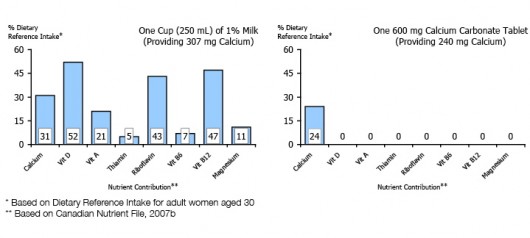You might need to check how much you get from food first.
If you have milk allergies, severe lactose intolerance, or don’t use milk or milk prodicts, you may need a calicum supplement. If you have high calcium needs and a small appetite, you may need to consider supplements in combination with calcium-rich foods.
Ideas for Action
- Find out how much calcium you are getting from your diet by using the Calcium Calculator™ interactive online tool.
- Find out which foods are calcium-rich. Try to improve your calcium intake with food before using a supplement. (The Calcium Calculator™ has a list of calcium-rich foods.)
- If you need a supplement, you may wish to consult a pharmacist, Registered Dietitian (RD) or physician about the best supplement for you.
Did you know…
Foods are the best source of nutrients. Supplements cannot replace everything you get in food. Nutrients present in calcium-rich foods are important components of a balanced diet.
Milk and milk products are rich in protein, calcium, riboflavin and vitamin B12 — nutrients essential to good health. It is difficult to obtain your daily requirements of calcium and vitamin D without consuming milk or milk products (1).
Calcium is a marker for a good diet. Studies show that people who drink more milk not only get more calcium, but also get significantly more magnesium, potassium, zinc, iron, vitamin A, riboflavin and folate (2). Dairy foods and milk are not only key calcium sources, but also foods associated with a “package of nutrients.” In addition, the higher intakes of iron and folate suggest that individuals who choose milk products make better food choices in general.

References
- Journal of the American College of Nutrition, Vol. 22, No. 5, 340-356 (2003).
- Journal of the American Dietetic Association, Vol. 104, No. 6, 895-902 (2004).



